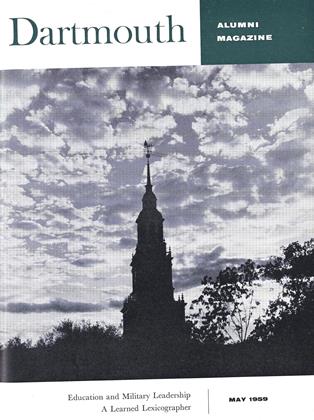Earl (Red) Blaik, who has retired after 25 years as head football coach, at Dartmouth and West Point, received the annual award of the Touchdown Club of New York at its dinner January 22. Following is an excerpt from Colonel Blaik's remarks that evening:
What does this award mean to me? It means years of association with men like you, without whose interest in football pleasant things like this tonight wouldn't be possible and, I dare say, football itself would starve. It means years of association with sports writers, men of the press - interesting, fascinating, wonderful men; some of them are my closest friends....
Of course this means years of association with wonderful young men of Dartmouth College and wonderful young cadets of the Military Academy. They understood my philosophy of football. They understood that football is incidental to the purpose of the players being in college, and I am indebted for that thought, that understanding so fundamental to the game, to none other than Dr. Hopkins. These men demonstrated so many times that winning football, championship football, is compatible with the highest standards of education.
As undergraduates, they were the intellectual equals of their contemporaries and as graduates their achievements stood the test of the most jaundiced academic eye. And many of these men are here tonight. And last and very important, they believed as I believe that the purpose of football is to win. The objective of football is to win, without question.
And this is what I'd like to say to all, be you from the Ivy League, be you from the Service Academies, or be you from Slippery Rock — to de-emphasize football is to dilute the will to win, which in turn is to discourage the individual's competitive urge. And may I add, when you rationalize the objective to win, all these fine virtues that you attach to football are lost.
And now, to the men of Dartmouth who played for me, to the men of West Point, I owe much to you, for you have been the joy of coaching.
Earl Blaik with President Hopkins in 1939.
 View Full Issue
View Full Issue
More From This Issue
-
 Feature
FeatureGove (gōv), Philip (fĩl'ìp) B.
May 1959 By JAMES B. FISHER '54 -
 Feature
FeatureDartmouth Study Urges ROTC Program Changes to Meet Nation's Needs
May 1959 By JOHN HURD '21 -
 Feature
FeatureFourteen Gained — Three to Go
May 1959 -
 Feature
FeatureWar Memorial Planned in Center
May 1959 -
 Article
ArticleTHE FACULTY
May 1959 By HAROLD L. BOND '42 -
 Class Notes
Class Notes1915
May 1959 By PHILIP K. MURDOCK, JAMES LeR. LAFFERTY
Article
-
 Article
ArticleDEAN LAYCOCK VISITS ALUMNI GROUPS
April, 1925 -
 Article
ArticleGEORGE FISHER BAKER, 1840-1931
DECEMBER 1931 -
 Article
ArticleWar Training and Education
June 1943 -
 Article
ArticleThree Clocks Are Given In Dr. Baketel's Memory
February 1956 -
 Article
ArticleAPARTNESS
MAY 1992 -
 Article
ArticleAnnette Gordon-Reed '81
July/Aug 2003 By Lisa Furlong

